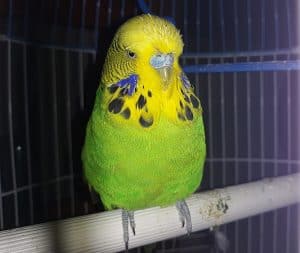Last Updated on by Mitch Rezman
Notably absent from the prior answers (on Quora) are the words “and I inspect my bird’s feet by flipping him over and examining his feet under a magnifying glass on a regular basis.”
As a vendor of bird cages and accessories for over 25 years, we advise people to take the dowel rod perches out of the cage immediately upon assembly.
Do dowel perches harm a budgie’s feet? (on Quora)
How does this cockatiel stand on a 4-inch diameter varnished wood footboard?
It does not fall into “proper perch diamaters”
We advocate that the dowels serve as “friendly” sticks to be used for when birds get trapped behind furniture and appliances and you can’t get your arm all the way down to the floor.
Dowel rod perches are also good for perch training and to help handle birds that are bitey.
There’s no need to get bitten by a bird whether it be a new bird or an older bird, when you have “Mr. Friendly the perch” for the birds to stand on, creating at least 12 inches between the bird’s beak and your fingers.
Dowel rod perches are softwood perches made from the cheapest wood birdcage manufacturers can find.
It is up to you when you get your cage set up to replace them with better perches that are suitable for your particular bird.
You can clean them but without steam cleaning or using disinfectant, their porous surfaces harbor bacteria.
Birds’ feet need to be challenged as they are on them 24/7 unless in flight.
Important to understand the nature of a bird’s foot and how it works.
Birds have no muscles from the upper thigh down to the toes.
Each leg and foot has a pair of flexor tendons.
Birds’ feet clamp onto a perch enabling them to sleep on a single foot by changing the angle of the ankle.
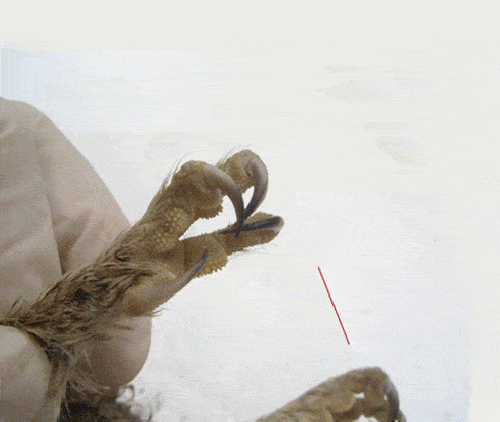
Birds of prey use the same ankle movement to kill prey in flight closing their talons into the body of the prey.
A major issue is that birds have very few nerves in their feet enabling them to land on all sorts of prickly and rough surfaces.
So although a bird’s foot might be injured, the pain may not be enough to trigger a signal to a human and the foot wounds may go unnoticed.
Every birdcage should have at least three types of perches, a hardwood, a softwood, and a soft rope perch especially to be used for sleeping.
Grooming perches can be introduced into a cage but should be installed low, close to a feeding dish or on the inside of the cage door.
Birds tend to have a lot of movement while eating and they will wipe their beaks on the perch they are on making grooming perches ideal at feeding time.
Placing a grooming perch low on the inside of the cage door allows a bird to be out of the cage while still on the cage and they will do a little happy dance on the grooming perch when the birdcage door opens.
Once again this will help keep bird’s toenails trimmed.
Parrots have zygodactyl feet with two toes pointing forward and two toes pointing backward.
Generally speaking, it’s best to have a perch with a large enough diameter so that the front and back toes do not meet avoiding possible injuries.
Unfortunately, birds don’t look at the Internet so they are clueless when it comes to perch diameter sizing.
For example, here are two birds comfortably standing on barbed wire.
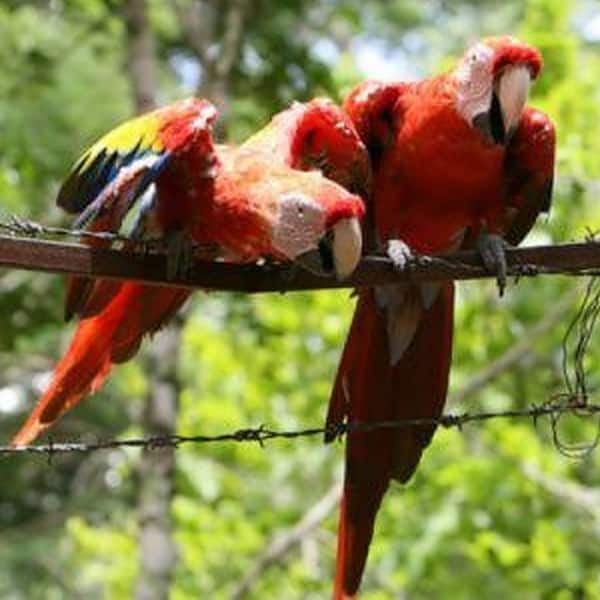
Don’t be lulled into complacency.
Get those dowel rod sticks out of the cage and create a better bird in-cage environment.
Cynthia J asks
My bird loves to chew on my roommate’s walking shoes.
If the doors to her area are not closed he will walk in there and chew holes in them.
I have had to reduce the rent to compensate for the damage on one occasion.
Recently she threw a pair out in the trash.
I retrieved them as they were on top and tied one to his perch.
He is having so much fun/working out his frustration chewing it up.
My concern is that the Nike walking shoes might not be good for him even though it does not seem that he is ingesting anything.
Can I let him continue to enjoy her sneaker or should it be taken away for his own good?
Dear Cynthia
Although allowing the bird to have the shoe as a chew toy seems like a simple solution, it will only reinforce the notion that shoes are fine for the taking and can lead to a lot more expensive replacements.
Steering your bird to its own toys, perhaps some new ones will help to hold interest until the shoes no longer are appealing.
I would add that shoes are bacteria-laden and may place your bird at risk.
Here’s an excerpt from an article on the subject.
”We’ll just go straight for the “yuck” factor here: Your shoes pick up sneaky bacteria which are then spread about your home when you wear shoes inside.
A study from the University of Arizona collected germs and microbes on footwear.
The researchers found 421,000 units of bacteria on the outside of the shoe, including E. coli, meningitis, and diarrheal disease; Klebsiella pneumonia, a common source for wound and bloodstream infections as well as pneumonia; and Serratia ficaria, a rare cause of infections in the respiratory tract and wounds, reports Reuters.
Best
MitchR
Scott S. asks
Hello – I read your posting on avian diabetes and I wanted to mention that we have a Cockatiel that has lived now for just shy of 10 years after developing diabetes.
If it’s of any help to you or your readers please let me know….we, along with our former vet Dr Jennifer Bloss are as close to being experts in this area as anyone.
Peanut was near death on several occasions but with knowledge and quick action we were able to stabilize his situation.
Please do let me know if I can help.
All the best to you:
Scott S.
Joyce L. asks
I want to know if body wash and shampoo that contains avocado oil is safe for my bird?
My Pionus loves to jump on me and walk all over me.
I can give the shampoo to someone else.
I love my little darling so much, better safe than sorry!
Hi Joyce
Birds are sensitive to anything avocado and should not be brought near the fruit.
There is little way of knowing whether avocado hair products are a problem until it is too late.
Best to ride on the side of caution and toss them.
best
mitchr
Author Profile
Latest entries
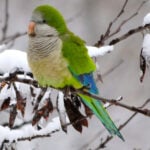 The Traveling BirdJune 26, 2025Can You Name 5 Parrot Species That Are Living Wild in the USA?
The Traveling BirdJune 26, 2025Can You Name 5 Parrot Species That Are Living Wild in the USA?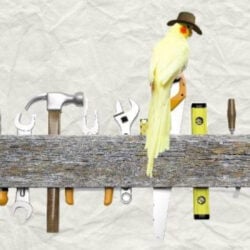 Bird BehaviorJune 26, 2025How is it Parrots Are Problem Solvers Social Animals and Even Use Tools?
Bird BehaviorJune 26, 2025How is it Parrots Are Problem Solvers Social Animals and Even Use Tools?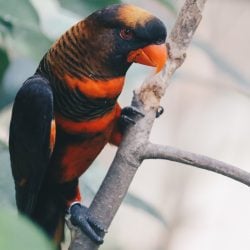 Bird & Parrot AnatomyJune 25, 2025How a Tiny Chemical Modification Makes Parrots Nature’s Living Paintings
Bird & Parrot AnatomyJune 25, 2025How a Tiny Chemical Modification Makes Parrots Nature’s Living Paintings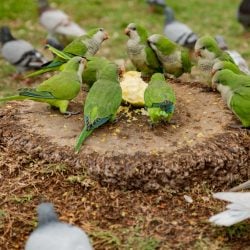 PigeonsJune 20, 2025How Do Parrots Thrive in Cities Outside Their Native Habitats?
PigeonsJune 20, 2025How Do Parrots Thrive in Cities Outside Their Native Habitats?


